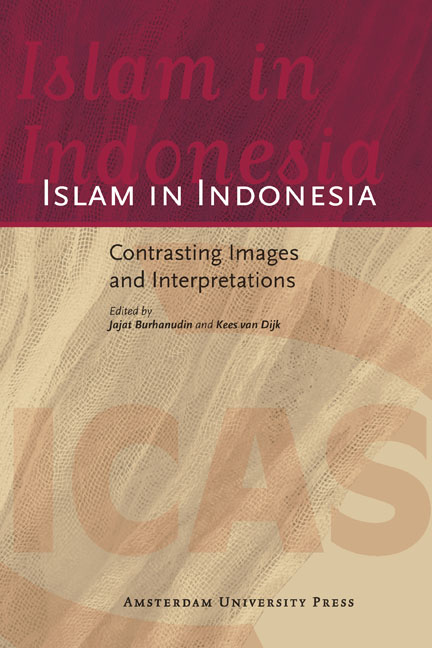Book contents
- Frontmatter
- Contents
- Introduction
- 1 Comparing Different streams of Islam: Wrestling with Words and Definitions
- 2 Defining Indonesian Islam: An Examination of the Construction of the National Islamic Identity of Traditionalist and Modernist Muslims
- 3 Indonesia in the Global Scheme of Islamic Things: Sustaining the Virtuous Circle of Education, Associations and Democracy
- 4 Distinguishing Indonesian Islam: Some Lessons to Learn
- 5 Islam, State and Society in Democratising Indonesia: A Historical Reflection
- 6 The Politics of Piety in the Pondok Pesantren Khusus Waria Al-Fattah Senin-Kamis Yogyakarta: Negotiating the Islamic Religious Embodiment
- 7 The Indonesian Muslim Feminist Reinterpretation of Inheritance
- 8 Managing Familial Issues: Unique Features of Legal Reform in Indonesia
- 9 A new Generation of Feminists within Traditional Islam: An Indonesian Exception
- 10 Religious Pluralism and Contested Religious Authority in Contemporary Indonesian Islam: A. Mustofa Bisri and Emha Ainun Nadjib
- 11 Islam and Humanitarian Affairs: The Middle Class and New Patterns of Social Activism
- 12 Dakwah radio in Surakarta: A Contest for Islamic Identity
- 13 Muslim Fundamentalism in Educational Institutions: A Case Study of Rohani Islam in High Schools in Cirebon
- 14 Majlis Tafsir Al-Qur’an and its Struggle for Islamic Reformism
- Glossary
- About the Editors and Contributors
- Bibliography
- Index
- Monographs
8 - Managing Familial Issues: Unique Features of Legal Reform in Indonesia
Published online by Cambridge University Press: 09 January 2021
- Frontmatter
- Contents
- Introduction
- 1 Comparing Different streams of Islam: Wrestling with Words and Definitions
- 2 Defining Indonesian Islam: An Examination of the Construction of the National Islamic Identity of Traditionalist and Modernist Muslims
- 3 Indonesia in the Global Scheme of Islamic Things: Sustaining the Virtuous Circle of Education, Associations and Democracy
- 4 Distinguishing Indonesian Islam: Some Lessons to Learn
- 5 Islam, State and Society in Democratising Indonesia: A Historical Reflection
- 6 The Politics of Piety in the Pondok Pesantren Khusus Waria Al-Fattah Senin-Kamis Yogyakarta: Negotiating the Islamic Religious Embodiment
- 7 The Indonesian Muslim Feminist Reinterpretation of Inheritance
- 8 Managing Familial Issues: Unique Features of Legal Reform in Indonesia
- 9 A new Generation of Feminists within Traditional Islam: An Indonesian Exception
- 10 Religious Pluralism and Contested Religious Authority in Contemporary Indonesian Islam: A. Mustofa Bisri and Emha Ainun Nadjib
- 11 Islam and Humanitarian Affairs: The Middle Class and New Patterns of Social Activism
- 12 Dakwah radio in Surakarta: A Contest for Islamic Identity
- 13 Muslim Fundamentalism in Educational Institutions: A Case Study of Rohani Islam in High Schools in Cirebon
- 14 Majlis Tafsir Al-Qur’an and its Struggle for Islamic Reformism
- Glossary
- About the Editors and Contributors
- Bibliography
- Index
- Monographs
Summary
Introduction
Indonesian state law on Muslim familial issues, as embodied in Marriage Law No. 1/1974 and Presidential Instruction No. 1/1991 regarding the Compilation of Islamic Law (Kompilasi Hukum Islam), introduced a number of reforms reflecting the inclusion of local customs, state interests and new issues in Islamic discourse in Indonesia, including gender issues. By doing so, it attempted to achieve an amalgamation of the classical legal doctrines of Islam, state interests and local tradition or adat. The accommodation of local tradition and state interests makes the law distinctly different from similar laws issued elsewhere in the Muslim world. The rules on representation of heirs, obligatory bequest (wasiat wajiba) and joint property are examples of the special characteristics of Indonesian law in this field. The distinctive features become even stronger when we look at how judges deal with family law.
This chapter examines how Indonesian state law addresses issues of Muslim family law by looking at specific questions relating to reforms. It discusses some examples of reform by observing the key concepts and interpretations of Islam used in drafting the new rules. It then compares the results with laws introduced in other Muslim countries in order to draw attention to similarities and differences and to analyse the factors that underlie the uniqueness of the Indonesian approach.
Ideas of reform in Islamic family law
The introduction of Islamic principles into national law has been a topic of discussion since Indonesia became independent in 1945. Indonesian Muslims now have what has come to be called the Kompilasi Hukum Islam, henceforth referred to here as the kompilasi. Issued in 1991, the kompilasi systematises and brings together in one book the Islamic legal rules regarding family law derived from various fiqh texts. Its compilation is one of a number of remarkable examples of the trend of legal codification in the Muslim world. The kompilasi is divided into three volumes on marriage, inheritance and endowment respectively. Its issuance by the Indonesian government complemented the reform of the religious judicial system in Indonesia, which had previously seen the ratification of the Religious Judicature Act in 1989 as the formal law regulating the position of religious courts within the national legal system and their composition, jurisdiction and procedures.
- Type
- Chapter
- Information
- Islam in IndonesiaContrasting Images and Interpretations, pp. 123 - 138Publisher: Amsterdam University PressPrint publication year: 2013



